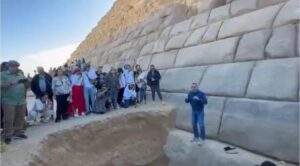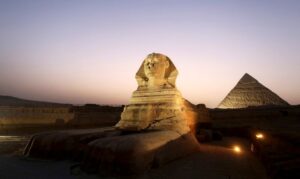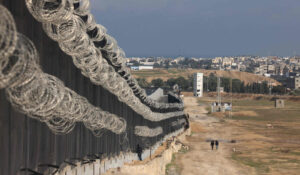In a significant reversal, Egypt has decided to abandon a contentious project aimed at reinstalling ancient granite cladding on the pyramid of Menkaure, one of the iconic structures at the Giza Necropolis. The decision, announced by a committee formed under the country’s tourism minister, follows widespread criticism and concerns raised by experts and the international community.
Mostafa Waziri, secretary general of the Supreme Council of Antiquities, had initially unveiled the ambitious plan, hailing it as “the project of the century.” However, the proposal sparked an outcry over fears of irreversible alterations to the ancient monument, prompting authorities to reassess the initiative. The pyramids of Giza are among the few remaining wonders of the ancient world, making them globally significant cultural treasures.

Also, read; US Signs Pact to Construct Military Bases for Somalia Army
The decision to halt the renovation project came after a thorough review by the Menkaure Pyramid Review Committee, which unanimously objected to the reinstallation of the granite casing blocks. According to Zahi Hawass, a renowned archaeologist who chaired the committee, the scattered nature of the granite blocks and the potential use of cement in the restoration process raised serious concerns about the integrity of the pyramid.

Hawass assured the public that the pyramids of Giza are safe and emphasized the need for meticulous planning and scientific study before undertaking any restoration work. The committee also expressed cautious approval for the excavation of Menkaure’s boat pits, a significant archaeological endeavor that requires careful consideration and planning.
“In archaeology, don’t be in a hurry. If you are in a hurry, you will ruin the site,” remarked Hawass, underscoring the importance of preserving Egypt’s rich cultural heritage through responsible stewardship and meticulous research.
 The decision to halt the controversial renovation project reflects Egypt’s commitment to safeguarding its priceless historical monuments while ensuring transparency and accountability in archaeological endeavors. As custodians of an ancient legacy that transcends borders, Egypt remains dedicated to preserving its heritage for future generations to cherish and explore.
The decision to halt the controversial renovation project reflects Egypt’s commitment to safeguarding its priceless historical monuments while ensuring transparency and accountability in archaeological endeavors. As custodians of an ancient legacy that transcends borders, Egypt remains dedicated to preserving its heritage for future generations to cherish and explore.

